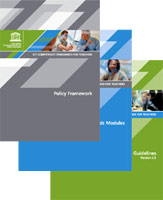UNESCO to launch ICT Competency Standards for Teachers at Moving Young Minds Conference
04-01-2008 (Paris)

ICT Competency Standards for
Teachers
© UNESCO
UNESCO guidelines for teachers to use information and communication technology (ICT) to improve education will be presented to education ministers from more than 100 countries and to the press at the Moving Young Minds Conference in London on 8 January.
Developed in cooperation with Cisco, Intel and Microsoft, as well as the International Society for Technology in Education (ISTE) and the Virginia Polytechnic Institute and State University (Virginia Tech), the ICT Competency Standards for Teachers have been designed to help educational policy-makers and curriculum developers identify the skills teachers need to harness technology in the service of education.
UNESCO’s Assistant Director-General for Communication and Information, Abdul Waheed Khan, and representatives of UNESCO’s private sector and academic partners in developing this project, will present the standards at a Press Conference at the Thames Suite of the Queen Elizabeth II Conference Centre in Westminster (8 a.m.) and, at 9.00 a.m., to Education Ministers.
“The ICT Competency Standards for Teachers provide a tool that will help policy makers and teacher training developers plan their use of information and communication technologies,” the Director-General of UNESCO, Koïchiro Matsuura, said. “These standards consist of modules that will help trainers prioritize their needs and design training curricula adapted to specific requirements and resources, reflecting UNESCO’s conviction that countries must occupy the driver’s seat of educational planning.”
The standards consist of three parts: a Policy Framework explaining the rationale, structure and approach of the project; A Competency Standards Modules’ Structure, which crosses the components of educational reform with various policy approaches to generate a matrix of skill sets for teachers; and Implementation Guidelines providing a detailed syllabus of the specific skills to be acquired by teachers within each skill set or module.
The standards were born of the realization that having a computer in the classroom is not enough, in and of itself, to ensure that teachers are able to impart the skills needed to prepare students for work and life in the 21st century. This is why the standards address much more than ICT skills: they examine these skills in light of pedagogical developments, curriculum and school organization and the needs of teachers wishing to improve their work and ability to collaborate with colleagues.
Ultimately, the ICT standards should help improve teacher practice overall, and contribute to the education of a better-informed citizenry able to advance economic and social development.
While defining ICT and education skills that can be shared internationally, the standards harmonize views and vocabulary regarding the uses of ICTs in teacher education, thus facilitating the international sharing of experience in this field.
UNESCO’s Assistant Director-General for Communication and Information, Abdul Waheed Khan, and representatives of UNESCO’s private sector and academic partners in developing this project, will present the standards at a Press Conference at the Thames Suite of the Queen Elizabeth II Conference Centre in Westminster (8 a.m.) and, at 9.00 a.m., to Education Ministers.
“The ICT Competency Standards for Teachers provide a tool that will help policy makers and teacher training developers plan their use of information and communication technologies,” the Director-General of UNESCO, Koïchiro Matsuura, said. “These standards consist of modules that will help trainers prioritize their needs and design training curricula adapted to specific requirements and resources, reflecting UNESCO’s conviction that countries must occupy the driver’s seat of educational planning.”
The standards consist of three parts: a Policy Framework explaining the rationale, structure and approach of the project; A Competency Standards Modules’ Structure, which crosses the components of educational reform with various policy approaches to generate a matrix of skill sets for teachers; and Implementation Guidelines providing a detailed syllabus of the specific skills to be acquired by teachers within each skill set or module.
The standards were born of the realization that having a computer in the classroom is not enough, in and of itself, to ensure that teachers are able to impart the skills needed to prepare students for work and life in the 21st century. This is why the standards address much more than ICT skills: they examine these skills in light of pedagogical developments, curriculum and school organization and the needs of teachers wishing to improve their work and ability to collaborate with colleagues.
Ultimately, the ICT standards should help improve teacher practice overall, and contribute to the education of a better-informed citizenry able to advance economic and social development.
While defining ICT and education skills that can be shared internationally, the standards harmonize views and vocabulary regarding the uses of ICTs in teacher education, thus facilitating the international sharing of experience in this field.
Related themes/countries
· United Kingdom of Great Britain and Northern Ireland
· Private Sector Partnerships
· ICT Competency Standards for Teachers
· ICT in Education: News Archives 2008
Share this story:
Contact information
-
Contact
- Tarek Shawki, UNESCO, Information Society Division
- Roni Amelan, UNESCO, Bureau of Public Information
- UNESCO Media Advisory No.2008-01
Source















